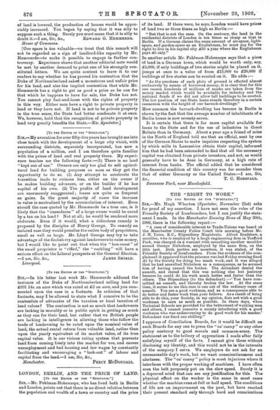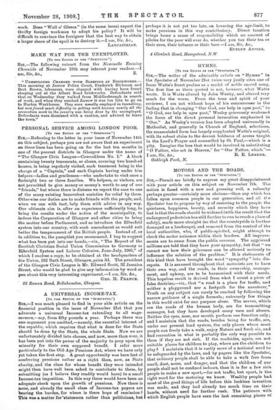THE " RIGHT TO WORK."
(To T IC EDITOR ov THE " SPECTATOR.... I
Sin,—Mr. Hugh Wharton (Spectator, November 21st) asks for proof of my assertion. I have not seen the rules of the Friendly Society of Ir•onfounders, but I can justify the state- ment I made. In the Manchester Evening News of May 30th, 1906, there is the following report:—
" A case of considerable interest to Trade-Unions was heard at the Manchester County Police Court this morning before Mr. J. M. Yates, K.C., Stipendiary Magistrate. Alfred Bradshaw, a moulder, who is employed by a large engineering firm in Trafford Park, was charged on a warrant with assaulting another moulder named George Nicholson, employed by the same firm, on the 26th inst. Both parties are members, it was stated, of the Friendly Society of Ironfounders. From the evidence of the com- plainant it appeared that the prisoner was last Friday evening fined 31 by the Society for doing too much work, and it was alleged that he had assaulted Nicholson as a consequence, as he accused him of having caused the bother. The defendant denied the assault, and stated that this was nothing else but jealousy because lie could do his work much better and faster than the others. The Stipendiary (to the defendant) :--` You have com- mitted an assault, and thereby broken the law. At the same time, it seems to me this case is one out of the ordinary cases of assault. You are a good workman, and as a consequence able to do better and faster work than your fellows. As a result of being able to do this, your Society, in my opinion, does not wish a good workman to earn as much as possible. In these days, when Technical Schools are provided for the betterment of working men and others, I cannot conceive a society interfering with a good workman who was endeavouring to do good work for his master.' Defendant was fined one shilling."
I approve of Conciliation Boards, for it would be difficult on such Boards for any one to press the "ca' canny" or any other policy contrary to good morals and common-sense. The statement as to the bribery of apprentices I made after fully satisfying myself of the facts. I cannot give these without disclosing my identity, and this would not be in the interests of the company I serve. We employers do not ask for an unreasonable day's work, but we want conscientiousness and alertness. The "Ca' canny" policy is most injurious where it
interferes with the proper working of machines. I have often seen the belt purposely put on the slow speed. Surely it is a depraved mind that can see any justification for this. The physical effect on the worker is the same in most cases whether the machine runs at full or half speed. The conditions of life are an improvement on the past, but have reached their present standard only through hard and conscientious work. Does "Wull o' Glesca" (in the same issue) expect the thrifty foreign workman to adopt his policy ? It will be difficult to convince the foreigner that the best way to obtain a larger share of the spoil is to destroy it.—I am, Sir, &c., LANCASTRIAN.



















































 Previous page
Previous page